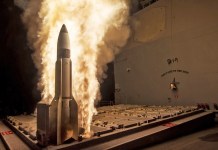Japanese PM Yoshihide Suga is in Washington for talks with US President Joe Biden amid China’s mounting criticism of Tokyo’s plan to release Fukushima nuclear waste into the Pacific Ocean.
The two Asian nations are also at loggerheads over Senkaku Islands.
China and South Korea have lambasted Japan’s plan to release wastewater from the Fukushima Daiichi nuclear plant into the Pacific. The Japanese government has taken the move as part of decommissioning process of the nuclear power plant.
Ten years ago, in March 2011, Japan had faced one of the major nuclear disasters in history when a tsunami prevented the cooling of three reactors at the Fukushima Daiichi nuclear power plant, releasing about 940 PBq of radiation, and forcing more than 150,000 people to evacuate the area.
The Japanese government has said the latest move is based “on the premise of strict compliance with regulatory standards that have been established, we select oceanic release.” Washington has supported Tokyo’s decision and appreciated its commitment to transparency.
Another bone contention between Beijing and Tokyo is Senkaku Islands in the East China Sea. China calls this string of uninhabited islands “Diaoyu Islands”. While it is under Japanese administrative control, China continues to stake claim to the “Diaoyu Islands”.
The Prime Minister spoke to the press at the Prime Minister’s Office regarding his visit to the United States and other matters.https://t.co/y6EjmatPSB#PMinAction (April 15) pic.twitter.com/8oETOHv5S4
— PM's Office of Japan (@JPN_PMO) April 16, 2021
Japan established a defense identification zone over these islands in 1968 to safeguard its territorial sovereignty. To further its expansionist idea, China declared its own defense identification zone in 2013 which overlaps that of Japan. According to Beijing, any aircraft or ship entering this area must notify Beijing beforehand.
China’s growing military activity in the region and its territorial are posing a threat to Tokyo. Apart from the dispute over Senkaku Islands, Tokyo has been closely watching China’s military build-up in the South China Sea.
China’s new Coast Guard law has also increased unease among the littoral states. It allows the Chinese coast guards to “take all necessary measures including the use of weapons to stop the violation and eliminate the danger”.
The law is seen as yet another attempt by Beijing to assert its dominance in the disputed South China Sea, which the communist country claims to be its territory.
News agency AP quoted Suga as saying that he hopes to reaffirm the Japan-US alliance’s strong bond and discuss a multinational effort to defend democratic values and counter China’s growing global influence and disputed territorial claims.
Suga said he and Biden will “compare and adjust our policies, and we will demonstrate to the rest of the world the leadership of Japan and the United States toward achieving a free and open Indo-Pacific region”.
The US and Japan are part of the Quadrilateral Security Dialogue or QUAD with India and Australia being the other two members. QUAD bloc, often termed as Asian NATO, aims to counter China’s growing influence in the Indo-Pacific region.
Follow EurAsian Times on Google News





